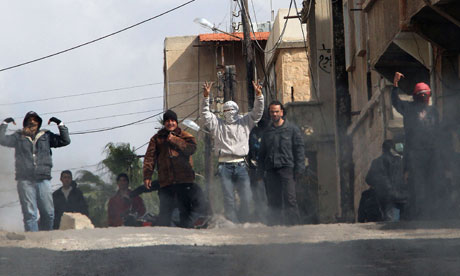The fear factor that has kept Syrians in check is failing. Assad will have to move fast to avoid the circling political vultures
By Simon Tisdall
This commentary was published in The Guardian on 25/03/2011
This commentary was published in The Guardian on 25/03/2011

Albert Camus, were he alive, would have understood the upheavals sweeping the Arab world. In La Peste (The Plague), the French-Algerian author and philosopher explored through allegory the deep-seated malaise that he believed shaped and determined the human condition. At its core, society – and the body politic – was rotten and absurd. From Libya to Egypt to Yemen, millions have come to recognise this diseased reality, and are trying valiantly to change it.
Syria is the latest Middle Eastern government to succumb to what might be termed "regime-itis", a metaphorical contagion, both liberating and deadly, that spreads faster than the time it takes a secret policeman to pick up his truncheon. In eerie succession, one after another, autocrats and despots across the region are coming down with freedom flu. Like a virus, it spreads, from mouth to mouth and hand to hand, allowing prior immunity to none. There is no cure.
The symptoms presented by Bashar al-Assad's regime in Damascus fit this diagnosis. What began as a prank by a group of children in the southern city of Deraa, spraying anti-government graffiti on walls, has escalated into large-scale protests, echoing across the country.
The regime is trying repression and on Wednesday, at least 37 people were killed. But this only sparked even bigger demonstrations. Assad is also trying concessions, including the possible relaxation of emergency laws and media controls. But so far, at least, nothing works. More and more people appear to be overcoming the "fear factor" that has kept Syrian society in check during what the Guardian's former Middle East correspondent, David Hirst, has called 51 years of "republican monarchy".
As their numbers increase, the opposition's demands grow proportionately in ambition and scale. This is what happened in Egypt and in Libya, and is happening now in Yemen. Next up, if he runs true to form, Assad will sack his interior minister or perhaps the whole government. Through spokesmen, the president is already denying personal responsibility for the killings. When he gives an interview to Christiane Amanpour, promising reform, it will be a certain sign his time is up.
Except calmer heads say Syria is not there yet, and perhaps never will be, for a host of prosaically unrevolutionary reasons. Syria is approaching "a defining moment for its leadership", the independent International Crisis Group (ICG) warned. "There are only two options. One involves an immediate and inevitably risky political initiative that might convince Syrians the regime is willing to undertake dramatic change. The other entails escalating repression, which has every chance of leading to a bloody and ignominious end," it said.
But like other analysts, the ICG suggested Assad, said to be relatively popular with the public, could yet survive the maelstrom: "A window of opportunity still exists to change these dynamics, although it is fast closing … A broad range of citizens – including members of the security apparatus – is desperately waiting for [Assad] to take the lead and propose, before it is too late, an alternative to spiralling confrontation."
This alternative should include a transparent investigation into the Deraa killings, the release of all political prisoners, and a timetable for constitutional reform, it said.
Assad may have to move fast, for political vultures are already circling. Without naming names, the regime is blaming outsiders for fomenting the unrest. While that is unlikely, old foes in Baghdad, Riyadh and Beirut would not shed many tears should Assad stumble. That goes for Washington, too. Speaking in Tel Aviv on Thursday, Robert Gates, the US defence secretary, urged an Egyptian-style army mutiny.
Gates said: "I would say that what the Syrian government is confronting is in fact the same challenge that faces so many governments across the region, and that is the unmet political and economic grievances of their people. Some are dealing with it better than others. I've just come from Egypt, where the Egyptian army stood on the sidelines and allowed people to demonstrate and in fact empowered a revolution. The Syrians might take a lesson from that."
Syria's Kurds and Sunnis who resent the Alawi minority's ascendancy might also welcome a shakeup. And Steven Cook, of the US Council on Foreign Relations, was quick to highlight possible external benefits.
"If a new, decent government emerged in Syria, it would alter the regional balance [and] improve the prospects for regional peace," Cook said – meaning Israel-Palestine. In theory, a democratic Damascus would be bad news for Hezbollah and Iran, and thus good news for the west.
But there are plenty of pragmatic and strategic reasons to fear the unpredictable consequences of revolution in Syria, too – not least instability on the borders of Israel and Iraq and the precedent it might set for Saudi Arabia, the west's oil pump, already struggling with freedom flu. If Syria, far more important in the scale of things than Libya, descended into civil strife or even civil war, wrong-footed western powers might have another powerful reason to regret their distracting rush to war with Muammar Gaddafi.
No comments:
Post a Comment